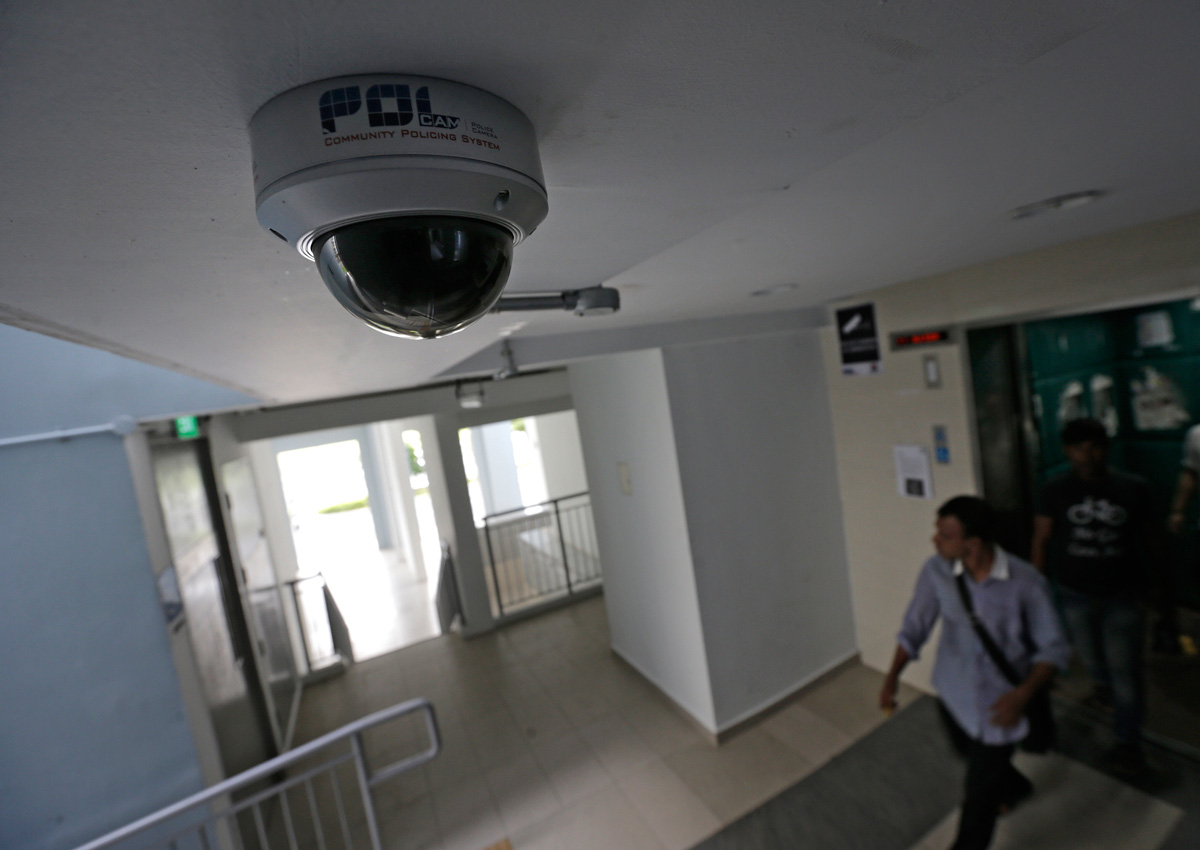Thousands of closed-circuit television (CCTV) cameras islandwide have helped deter loan sharks, nab litterbugs and stop illegal parking, according to government figures.
And residents generally welcome the reassurance that such surveillance provides, said Members of Parliament.
“I quite often receive requests to put cameras up. I haven’t received any to take cameras down,” said Holland-Bukit Timah GRC MP Liang Eng Hwa. Most of the Housing Board blocks in his area now have CCTV cameras.
This is due to the police’s nationwide push to have cameras in every HDB block by the end of this year.
Since 2012, over 52,000 police cameras have been installed in 8,600 blocks, Dr Teo Ho Pin said in Parliament in January. He is coordinating chairman for the town councils run by the People’s Action Party.
Ang Mo Kio GRC MP Gan Thiam Poh said: “I do notice that there are improvements, especially in the cases of loan-shark harassment that used to be quite common.”
Potong Pasir MP Sitoh Yih Pin used to get loan-shark harassment cases at his Meet-the-People Sessions every month, before cameras were installed.
“Now I haven’t got any for quite a while,” he said.
Police figures released last month showed that blocks with cameras see fewer unlicensed moneylender harassment cases involving property damage. The number of such cases reported at 2,152 blocks with police cameras plummeted from 1,617 in 2013 – before those blocks had cameras – to just 426 last year.
Toa Payoh resident Tan Li Choo has noticed more CCTV cameras appearing, but does not consider them an invasion of privacy. “It’s okay if they are for safety purposes only,” said the unemployed 38-year-old.
Footage from police cameras has led to the arrests of unlicensed moneylenders in 360 cases of harassment since 2012, according to the police Annual Crime Brief 2015 released last month.
Town councils also install CCTVs of their own inside lifts. “It does help against anti-social behaviour such as littering, urination and vandalism,” said an East Coast-Fengshan Town Council spokesman.
The National Environment Agency (NEA) has its own eyes too, with almost 3,000 cameras in HDB estates to catch high-rise litterbugs, Senior Minister of State for the Environment and Water Resources Amy Khor said in Parliament earlier this month. Litterbugs are successfully identified in about a third of cases caught on camera, she added.
In January last year, for instance, NEA’s cameras helped nab a 38-year-old Sengkang resident who threw 34 cigarette butts out of his flat window over four days. He was fined a record $19,800.
Meanwhile, more than 300 parking enforcement cameras have been put up by the Land Transport Authority (LTA), helping to cut cases of illegal parking by as much as 90 per cent, the LTA told The Straits Times last September.
Traffic Police speed cameras also discourage reckless driving, said Mr Sitoh, who heads the Government Parliamentary Committee for Transport. “By and large, Singapore drivers are very responsible. But I think having the cameras there does help, it’s a good reminder to our motorists to drive carefully,” he said.
However, Associate Professor Lee Der-Horng, a transport researcher at the National University of Singapore, noted that drivers might slow down when they see a speed camera but speed up again afterwards. This is unavoidable unless actual mindsets can be changed, he said. “Before that overall awareness is there, the existence of cameras is still very much necessary.”
NUS sociologist Daniel Goh noted that anti-social behaviour is usually opportunistic.
“Thus camera surveillance, if effective, tends to displace the behaviour to other locations rather than change the behaviour.”
Still, cameras can be useful as one tool among others, he added. They can help create the habit of proper behaviour – which can then be reinforced with education about “communal norms of right and wrong”.
“Fear of being caught by camera surveillance inculcates a habit, and if the person is educated with the norms, the camera will then subsequently remind him of the norms,” he concluded.
janiceh@sph.com.sg
Additional reporting by Veena Vinod

This article was first published on March 09, 2016.
Get a copy of The Straits Times or go to straitstimes.com for more stories.






